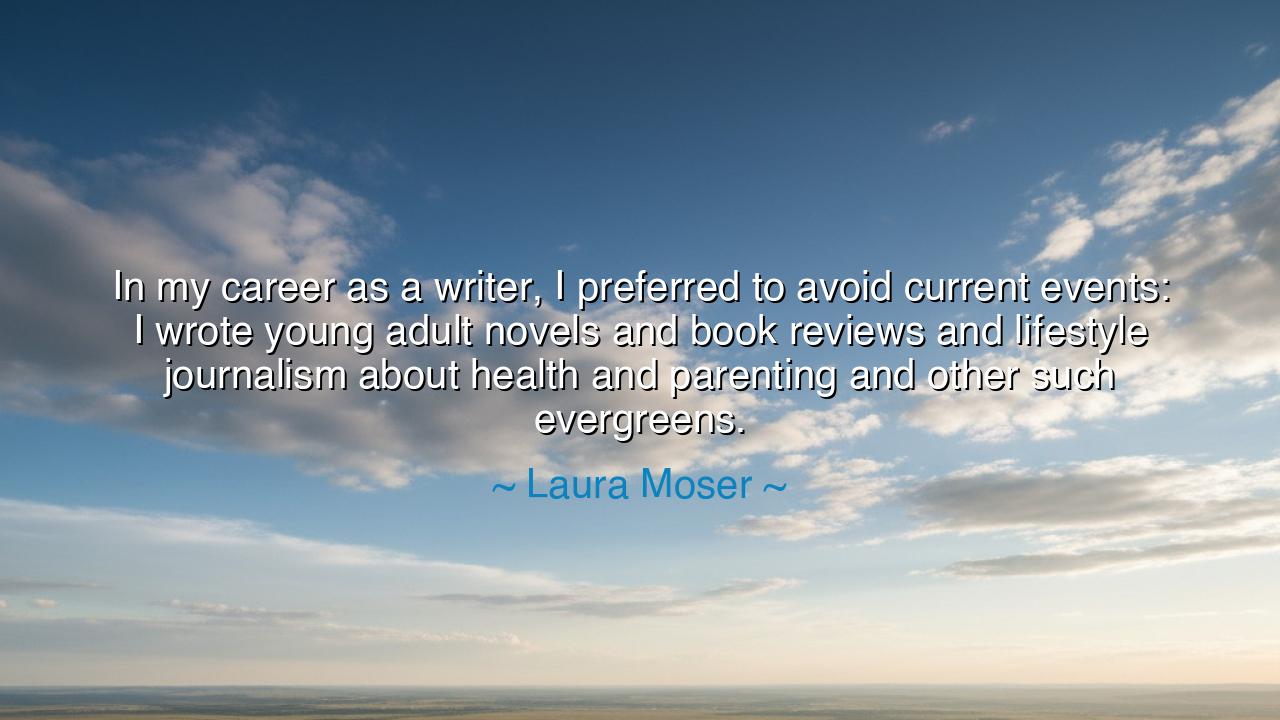
In my career as a writer, I preferred to avoid current events: I
In my career as a writer, I preferred to avoid current events: I wrote young adult novels and book reviews and lifestyle journalism about health and parenting and other such evergreens.






When Laura Moser reflected: “In my career as a writer, I preferred to avoid current events: I wrote young adult novels and book reviews and lifestyle journalism about health and parenting and other such evergreens,” she unveiled a truth about the enduring power of what she calls the evergreens. In her words we see the distinction between the fleeting and the lasting, between the noise of the present moment and the timeless matters of the human heart. For while current events blaze brightly and fade, the themes of youth, health, and parenting endure, untouched by the passing years.
The origin of this wisdom lies in the writer’s path itself. Many writers, seduced by the urgency of politics and the drama of the day, tether their words to the moment. Yet Moser chose another road — the road of universality. By writing of young people finding themselves, of parents guiding children, of health and the body’s fragile strength, she gave her words a longer life. Her work sought not to echo the headlines, but to whisper truths that would still matter when the headlines had been forgotten.
History offers us countless mirrors of this choice. Consider the words of Marcus Aurelius, whose Meditations rarely mention the immediate battles of Rome, but dwell instead on patience, duty, and the struggles of the soul. His reflections are read today not because they recounted events, but because they reached into the eternal. Or think of Jane Austen, who wrote not of Napoleon’s wars but of families, marriages, and the subtle dance of human hearts. Though she avoided the thunder of current events, her work remains alive centuries later. Like Moser, they chose the evergreens, and their legacy endured.
The emotional weight of Moser’s confession is also profound. In an age where the demand to be relevant is constant, she admits she sought refuge in subjects that transcend the present storm. To write of parenting is to write of love and sacrifice that will always exist. To write of health is to write of the universal human struggle against frailty. To write of young adults is to write of the eternal passage from innocence to experience. These themes are not bound to the hour but to the human condition itself.
Her choice also carries a kind of heroism. For to avoid the clamor of current events is not cowardice but courage. It is the courage to say: I will not chase the fleeting, but I will hold fast to the lasting. Many who mocked the “irrelevance” of evergreens have seen their urgent writings wither into dust, while the so-called small matters of family and health remain fresh and vital to every generation. The writer who tends to the eternal becomes a steward of wisdom, a gardener planting trees whose shade will be enjoyed by those yet unborn.
The lesson for us is clear: in our lives, as in writing, we must learn to discern between the fleeting and the lasting. Do not despise the daily news, for it has its place. But do not forget to invest your energy, your words, your actions into the evergreens — those things that endure. Your relationships, your children, your health, your integrity: these are not bound by time. To build them is to build a legacy far stronger than the noise of the moment.
Practical actions must follow: when you feel overwhelmed by the rush of current events, pause and ask yourself what matters eternally. Pour yourself into the growth of your children, into the tending of your body and soul, into the building of character that will still stand long after today’s controversies are forgotten. And for those who write, speak, or create: remember that the world needs voices that echo through centuries, not only through news cycles.
So let Laura Moser’s words be remembered as an ancient teaching in modern form: seek the evergreens, not the withering leaves of the hour. For health, parenting, and the journey of the young are not passing things but eternal truths. Invest yourself in what endures, and your life’s work will not fade with the setting sun, but live on like the evergreen tree — steadfast, flourishing, and alive across generations.






AAdministratorAdministrator
Welcome, honored guests. Please leave a comment, we will respond soon